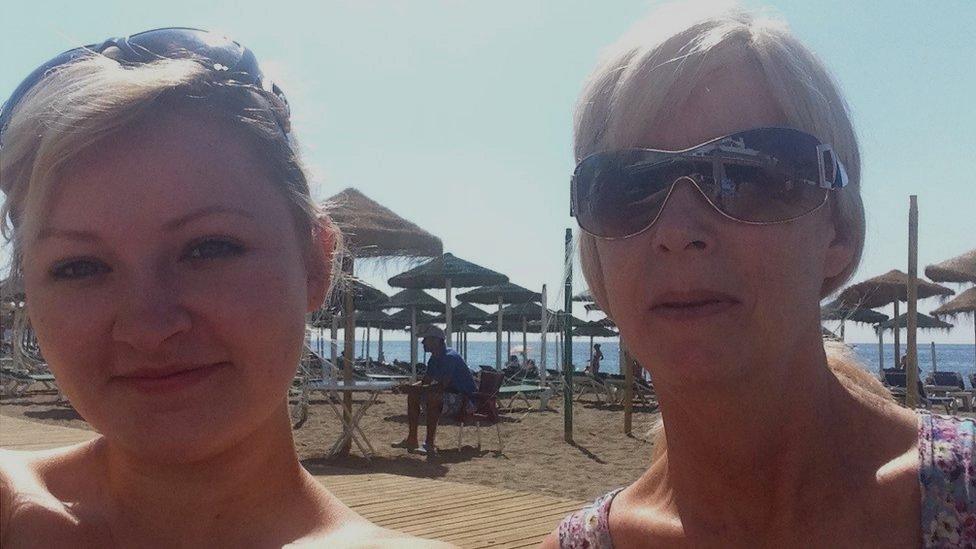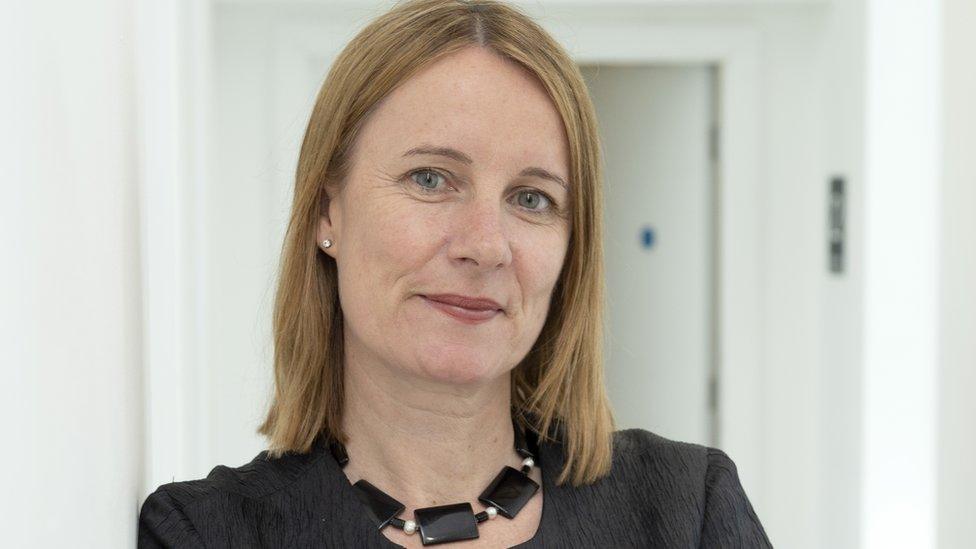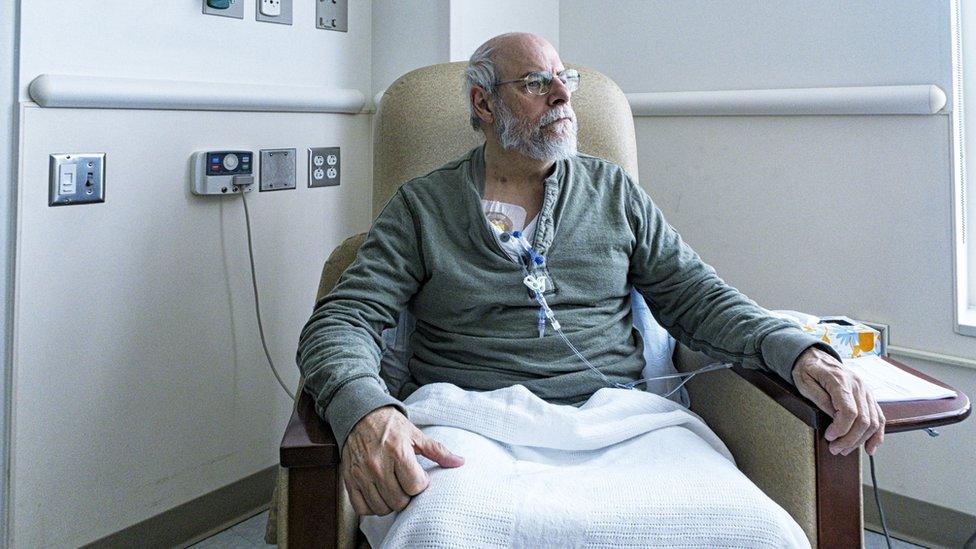Lung cancer screening could have saved my mum
- Published

Kelsey Mackay and her mother Christine Livingstone on holiday shortly before her cancer took a turn for the worse
A daughter who lost her mother to lung cancer is backing calls for targeted screening for the disease to be introduced in Scotland
Kelsey Mackay's mother, Christine Livingstone, was a lifelong smoker who died at the age of 52.
Cancer Research UK has said thousands of deaths could be avoided through a national screening programme.
The charity will make the case for screening when it meets Health Secretary Michael Matheson later.
Kelsey was 20 years old and just starting a career as an estate agent when her mother, Christine Livingstone, first fell ill.
"Mum just thought she had a chest infection at first," the now 31-year-old said.
"The earlier cancer is detected the more successful the outcome is likely to be. I wish things could have turned out differently for my family."
Ms Livingstone died in St John's Hospital, West Lothian, on 19 September 2013.
Ms Mackay, from Armadale, West Lothian, added: "Mum was my best friend and I miss her every day."
New analysis by Cancer Research UK estimates at least 2,300 lives in Scotland could be saved from lung cancer over the next decade if targeted screening was introduced for those most at risk.
The UK National Screening Committee has recommended that all home nations move towards implementing lung cancer screening to target those considered to be of high risk of developing lung cancer - people aged between 55 and 74 who either smoke or used to smoke.
Cancer screening programmes help reduce deaths from cancers by diagnosing them early or preventing them from developing in the first place.
'Months to live'
It took four months before Ms Livingstone's cancer was detected, despite sudden weight loss and a cough which she could not shake.
In July 2012 she was diagnosed with small cell lung cancer and was started on a 12-week treatment which included chemotherapy and radiotherapy.
By Christmas her scan results were looking good and her family had hoped that the cancer was gone for good.
By May 2013 she appeared well enough to go on holiday to Marbella in Spain to celebrate her daughter's 21st birthday.
"I remember mum swimming in the pool and eating well," her daughter said.
"All through cancer treatment she'd said what she really wanted to do was relax on a beach and feel the warmth of the sun. It was a good holiday."
But when Ms Livingstone returned from Spain, she developed dizzy spells and a scan revealed the cancer had spread to her brain. Doctors gave her about six months to live.
Ms Mackay said: "Mum went downhill very quickly. I helped care for her at home at first with the help of Marie Curie nurses but Mum died in hospital.
"Mum always spoke about how much she'd enjoy becoming a gran. She'd even knitted some baby clothes for me to give to my own children one day.
"I treasure these baby clothes and my own children have grown up hearing all about mum," the mother-of-two added.

Kelsey Mackay said she wants her two children to grow up in a healthier Scotland
Lung cancer remains the leading cause of cancer death in Scotland and the lung cancer death rate is three times higher among those who live in the country's most deprived areas, according to Cancer Research UK.
Lung checks have started to be rolled out in England, but there are currently no confirmed plans for an equivalent initiative in Scotland.
Cancer Research UK said the majority of people who are diagnosed with lung cancer in Scotland are already at a later stage (stages 3 and 4).
Ms Mackay said she was determined to see future generations grow up in a healthier country where tobacco no longer claims lives.
"I wish we'd had more time, more years, more chances to make memories with my mum. But looking back, mum grew up in a Scotland where so many people smoked," she said.
"Mum smoked around 40 cigarettes a day. And her own mum was also a heavy smoker, dying from a smoking-related illness.
"My duty to my children is to help break that cycle so they can look ahead to a healthy future."

Cancer Research UK said lung cancer deaths could be avoided if the disease was identified earlier
Cancer Research UK said if lung screening were to be introduced, around 400 extra cases could be diagnosed at an early stage (stages 1 and 2) rather than a late stage (stages 3 and 4) in Scotland per year - meaning 4,000 cases over the next decade.
The charity's chief executive, Michelle Mitchell, will discuss the case for introducing a lung cancer screening programme in Scotland when she meets Health Secretary Michael Matheson at the Scottish Cancer Conference in Glasgow on Monday.
"A comprehensive commitment by the Scottish government to implement a fully-funded national targeted lung cancer screening programme is a real chance to reduce the toll of lung cancer on Scots," she said.
"There have been big improvements in how we diagnose and treat other forms of cancer, but long-term lung cancer survival in the UK isn't much higher than it was 50 years ago.
"This is unacceptable when evidence shows that earlier diagnosis through targeted lung cancer screening can potentially help thousands of people live longer healthier lives."
Screening studies
A screening study has already been under way in the NHS Lothian health board area.
New funding from the Scottish government will also see patients from NHS Grampian, NHS Greater Glasgow and Clyde and NHS Highlands and Islands invited for a lung check over the coming months.
The aim of the study is to provide evidence to inform the implementation of a screening programme in Scotland, on matters like staffing and access to services.
A Scottish government spokesman welcomed the recommendation of targeted screening but said the UK national screening committee itself recognised there were "significant complexities that must be worked through ahead of implementation".
"We have established a Scottish Expert Advisory Group, in collaboration with National Screening Oversight (NSO), which will consider how the recommendation can best be taken forward," the spokesman added.
"Furthermore we have agreed further funding of a one-year extension of the University of Edinburgh's feasibility study, LungScot, into targeted lung health checks for high risk individuals."
Related topics
- Published15 June 2023

- Published28 November 2022
